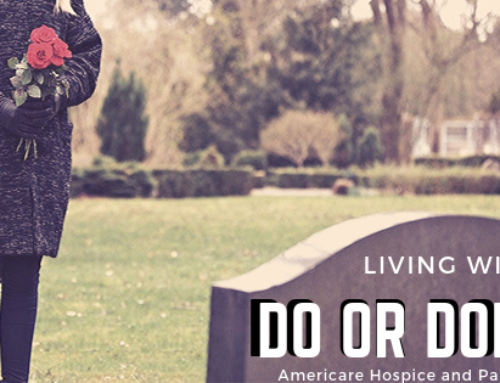Coping With The Inevitable Loss Of a Loved One
Grief & Loss: Essential Tips To Deal With The Death Of Your Loved One In Arizona
Losing someone you love is always going to be hard, regardless of whether it’s a positive or negative relationship or even if you know that it is coming because your loved one has a terminal illness. No matter whether we have an idea of when someone we love is going to die, no one ever really feels fully prepared to say goodbye when their death inevitably happens. If you do know that your loved one is probably going to die in the near future, you may start your grieving process before their death and this is normal (also known as anticipatory grief). Acknowledge how you are feeling and share it with others who can support you on the journey. If your loved one is receiving hospice care, you can get extra support and guidance from the team, including any chaplains or grief counselors they have on staff. Do not be afraid to voice the struggles or sadness you are feeling with them as supporting you and guiding you on this journey is part of their role.
Here are some other things you can possibly do to help cope with the inevitable loss of a loved one:

Say All the Things You Need to Say
A lot of people feel real sadness and despair after a loved one dies because they ruminate about all the things they wanted to say but never got a chance to. They may have wanted to make up with an estranged brother, or they may have wanted to tell a parent how they hurt them. Some people regret never having told a person how much they loved them.
Knowing that your loved one is terminally ill means that you know you only have a limited amount of time left to say anything you want to. Take advantage of this opportunity. Unburden yourself of all the things you’ve wanted to express. You may want to make amends, or you may want to work through your own hard feelings. Or you may just want to talk about how much the person has meant to you and how deeply you love them and will miss them. Whatever you need or want to say, say it now while you have the chance. You don’t want to live with that regret, knowing you will not have another opportunity to express anything directly to them later.
Learn about What Will Come
Talk to your hospice care providers in Chandler about what you can expect when your loved one dies. There may be a worsening of symptoms, certain changes in their bodily appearance and breathing, change in their behavior, or your loved one may pass suddenly. If the condition will likely bring on a worsening of symptoms, it’s important for you to learn that so you can prepare yourself and be able to handle it a little better. Not knowing can lead to a lot of fear and added stress at a time that is already difficult.
You can also get additional hospice care for your loved one at the end, ensuring that they have the support they need to get through any worsening or severe symptoms. Seeing your loved one cared for properly will also make it a bit easier for you to process and accept the situation as it unfolds.
Enjoy Special Moments Together
You still have time left, so make the most of it! Create special, priceless moments with your loved one that you can remember later and treasure. Spend time talking to your loved one about their life or about your memories together. Listen to special music together. Bring children or pets to visit. Play games together. Look at pictures and old videos. Do anything that allows you to spend time together and to be happy together.
When you are grieving after their death later, you can remember these special times you were able to enjoy. You may be sad that your loved one has died, but you can be grateful you had extra time together and made it count. Try to focus more on being their daughter, spouse, friend, etc. vs only their caregiver. These are moments that will be priceless when you look back.
Get Counseling and Support
Losing a loved one will be hard, no matter what you do to prepare. You can work through your grief and other feelings you may be having with a grief counselor (note not all licensed counselors are trained in helping you with grief) or through a grief program (of which there are several). You can start this support before your loved one dies, and you should continue afterward.
You should also build a support network of friends and family to help you through this time. You can attend support groups for those who have terminally ill loved ones and/or for those who have suffered the loss of a loved one. Your hospice care provider will likely offer bereavement support or host a grief support group or program periodically. They can often also refer you elsewhere to best suit your needs if necessary or desired.
You’ll never be totally ready to say goodbye to someone you love. But following these tips can help you get through the journey a little easier. You’ll be able to create memories you’ll treasure, and you’ll be able to process your feelings so that you are not overwhelmed with grief and feel alone after their death.
At Americare Hospice and Palliative Care, we not only provide exceptional hospice care for our patients, but we also provide grief and bereavement support services for their families. Our goal is to provide the best quality of life for our patients when they are terminally ill, as well as to help their families through the difficult emotions of taking care of a sick loved one and, ultimately, grieving their death. Call us today to learn more about our hospice and palliative care services at 480-726-7773 or visit us online at www.americarehospice.org.

Americare Hospice and Palliative Care
1212 N. Spencer St., Suite #2
Mesa, Arizona 85203
Office: (480) 726-7773
Fax: (480) 726-7790
Email: info@americarehospice.org



